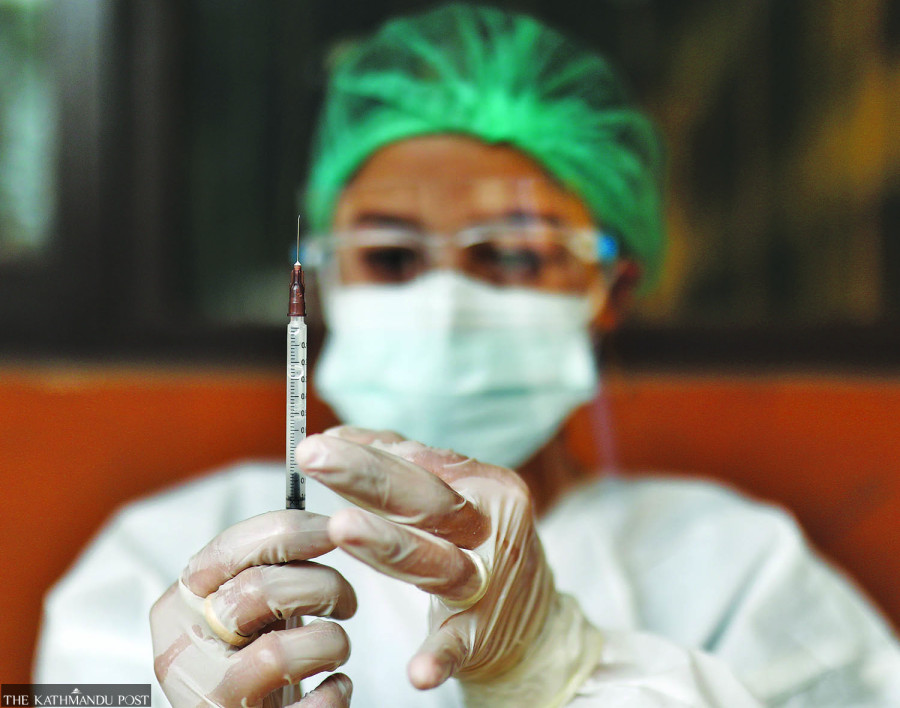Health
COVAX to send 100,620 doses of Pfizer vaccine by October end
Officials say the shots will be given from 22 hospitals across the country to people with compromised immunity.
Arjun Poudel
Nepal is set to receive 100,620 doses of Pfizer-BioNtech Covid-19 vaccine in the last week of October from the COVAX facility, officials at the Ministry of Health and Population said.
It is part of the 13 million doses sufficient to inoculate 20 percent of the total population committed by the COVAX facility, the UN backed international vaccine sharing scheme.
“We are informed that the vaccine will arrive within October,” said Sagar Dahal, chief of the National Immunisation Programme. “Though the final date of vaccine delivery is not confirmed yet, we expect the jabs to arrive on October 26 or 27.”
The ministry has decided to provide the jabs from 22 hospitals throughout the country to the people with compromised immunity.
“People suffering from renal failure, cancer patients, heart patients and those having diabetes, who have not received the vaccine will be provided Pfizer-BioNtech Covid-19 shot,” said Dahal. “Due to limited doses of the vaccine offered to us by COVAX, we have decided to vaccinate the immunocompromised people.”
Along with the Pfizer-BioNtech Covid-19 vaccine, officials at the Health Ministry said that 1.6 million doses of Vero Cell vaccine, pledged by China under grant assistance, will also arrive within this month.
Authorities concerned have started preparations for storing and rolling out the vaccines and prepared guidelines for immunisation workers to administer Pfizer-BioNtech Covid-19 vaccine.
Pfizer-BioNtech will be the first mRNA-based Covid-19 vaccine to be used in Nepal. The vaccine developed jointly by the US-based Pfizer and the German firm Biontech uses a copy of a molecule called messenger RNA (mRNA) to produce an immune response.
It is said that the Pfizer-BioNtech vaccine was 95 percent effective at preventing laboratory-confirmed infection with the coronavirus.
According to the US Centers for Disease Control and Prevention, the Pfizer-BioNTech vaccine was also highly effective at preventing laboratory-confirmed Covid-19 infection in adolescents between 12-15 years old, and the immune response in these adolescents was at least as strong as the immune response in 16-25-year-olds in clinical trials.
“Evidence shows mRNA Covid-19 vaccines offer similar protection in real-world conditions as they have in clinical trial settings—reducing the risk of Covid-19, including severe illness by 90 percent or more, among people who are fully vaccinated,” the US Centers for Disease Control and Prevention said on its website.
The vaccine needs to be stored in minus 70 degrees Celsius, which is not supported by Nepal’s existing vaccine storage facilities.
So far, the COVAX facility has supplied 3,497,490 doses of vaccine (1,534,850 doses of single-shot Janssen, 1,614,740 doses of AstraZeneca, and 348,000 doses of Covishield from AstraZeneca).
The facility has also provided four ultra cold freezers to store the Pfizer-BioNtech Covid-19 vaccine. The four freezers can store over 100,000 doses, according to Upendra Dhungana, chief of the Logistic Management Section under the Department of Health Services.
Officials at the Health Ministry also said they are close to clinching a deal with the vaccine maker Pfizer-BioNTech to purchase 6 million doses.
Nepal needs to vaccinate around 78 percent of its 30 million population—or around 25 million people, as per the government’s new plan that includes those aged between 12 and 18 years. The government earlier had planned to vaccinate only those aged 15 years and above.
Since around 4-5 million people are said to be living abroad, the government needs to vaccinate around 19-20 million people. For this, the country needs a little over 40 million doses of double-shot vaccines.
Nepal has so far used AstraZeneca vaccine manufactured in India, Japan and Europe; Vero Cell vaccine developed by Sinopharm of China; and the single-shot Janssen made by Johnson & Johnson in the United States.
The government has already purchased 10 million doses of the Vero Cell vaccine from China. A deal has been reached with COVAX to purchase 9.9 million doses (5.9 million doses of Vero Cell and 4 million doses of Moderna vaccine) through a cost-sharing mechanism.
Altogether, the country has received 18,857,590 doses of Vero Cell, AstraZeneca and Johnson and Johnson vaccines.




 11.84°C Kathmandu
11.84°C Kathmandu















